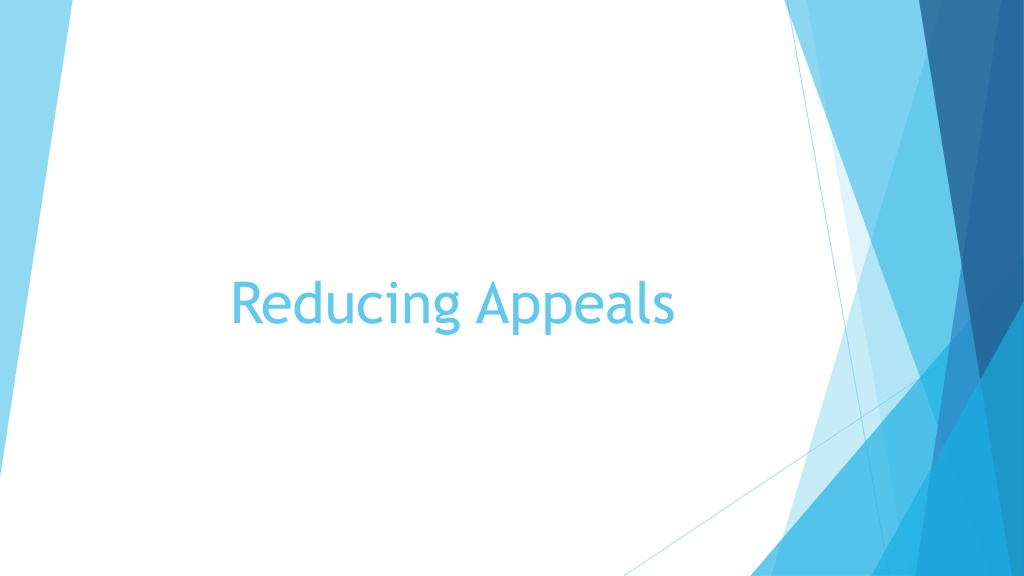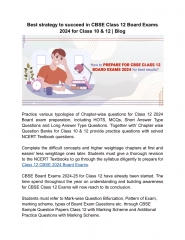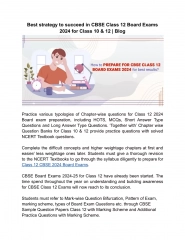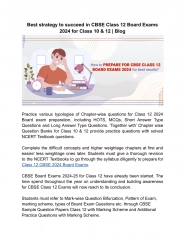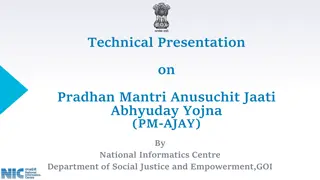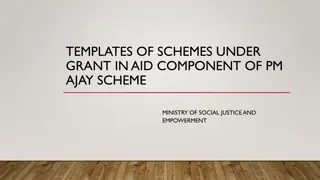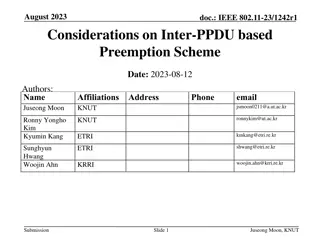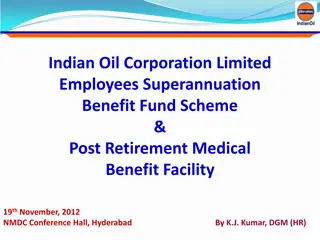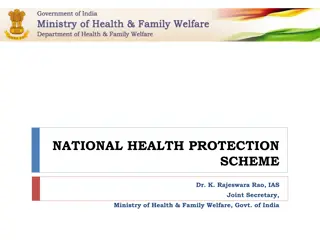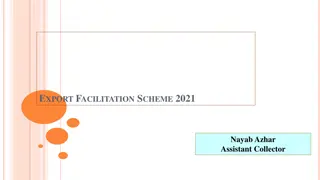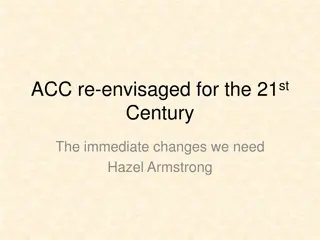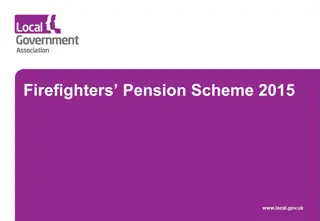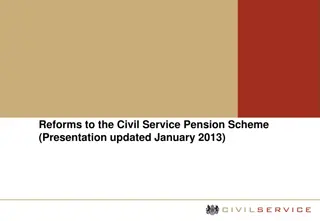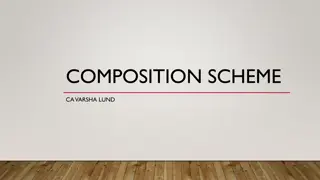Understanding the Special Preparation Scheme for Legal Professionals
The Special Preparation Scheme, outlined in the Criminal Legal Aid Regulations, specifies the criteria for calculating special preparation fees for litigators and advocates. It addresses reasons for nil assessments, deductions, and rejections, emphasizing the importance of meticulous claim submissions and adherence to regulations. The scheme details the required hours for tasks like reviewing evidence and reading excess pages, ensuring fair remuneration for legal professionals.
Uploaded on Sep 22, 2024 | 0 Views
Download Presentation

Please find below an Image/Link to download the presentation.
The content on the website is provided AS IS for your information and personal use only. It may not be sold, licensed, or shared on other websites without obtaining consent from the author. Download presentation by click this link. If you encounter any issues during the download, it is possible that the publisher has removed the file from their server.
E N D
Presentation Transcript
Main reasons for nil assessments, deductions and rejections Claims for work which fall outside of the scope of the special preparation scheme. Page count discrepancies. Lack of information in claim.
Scope of the Special Preparation Scheme: The Regulations For Litigators, the Criminal Legal Aid (Remuneration) Regulations 2013 state: 20 (3) The amount of the special preparation fee must be calculated from the number of hours which the appropriate officer considers reasonable (a) where sub-paragraph (1)(a) applies, to view the prosecution evidence; and (b) where sub-paragraph (1)(b) applies, to read the excess pages, and in each case using the rates specified in the table following paragraph 27
Scope of the Special Preparation Scheme: The Regulations For advocates, the Criminal Legal (Remuneration) Regulations 2013 state; 17 (3) The amount of the special preparation fee must be calculated (a) where sub-paragraph (1)(a) applies, from the number of hours preparation in excess of the amount the appropriate officer considers reasonable for cases of the same type; (b) where sub-paragraph (1)(b) applies, from the number of hours which the appropriate officer considers reasonable to read the excess pages; and (c) where sub-paragraph (1)(c) applies, from the number of hours which the appropriate officer considers reasonable to view the prosecution evidence.
Scope of the Special Preparation Scheme: The Regulations For advocates, the Criminal Legal Aid (Remuneration) (Amendment) Regulations 2018, The Criminal Legal Aid (Remuneration) (Amendment) (No2) Regulations 2018 both state: 17 (3) The amount of the special preparation fee must be calculated (a) where sub-paragraph (1)(a) applies, from the number of hours preparation in excess of the amount the appropriate officer considers reasonable for cases of the same type; (b) where sub-paragraph (1)(b) applies, from the number of hours which the appropriate officer considers reasonable to read the excess pages.
Work excluded for payment under the special preparation scheme Work undertaken on cases which do not attract a graduated fee (committal for sentence, breach of crown court order, appeal against conviction or sentence). Work undertaken during confiscation proceedings. Work being undertaken prior to the grant of the Legal Aid Representation Order/extension of the order for a second advocate. Work undertaken after legal aid transferred or the case has concluded.
Exclusions: Claims under PPE or Electronic Material Any time spent undertaking anything other than the reading/viewing of the relevant material is excluded from payment under the special preparation scheme. This includes: Cross-referencing documents Preparation of schedules, chronologies or other ancillary work Conference/liaison time Preparation of any defence documents (outside of very unusual/novel cases for advocates) Video and Audio (outside of very unusual/novel cases for advocates) Considering unused material (outside of very unusual/novel cases for advocates).
Very Unusual/Novel points of law or factual issues There are no categories of work which are explicitly excluded under this header. However, any work being claimed for under this header should have arisen as a direct result of the very unusual/novel points of law or factual issues. This work should also be substantially in excess of the work typically undertaken on cases of the same type. Special preparation is only payable for the hours that are in excess of the amount normally undertaken.
Tips for avoiding deductions/refusals Avoid including time engaged in non-reading tasks in your attendance notes/work log. If it is necessary to include them, you should quantify how much time was spent engaged in each aspect. When completing your work log/attendance notes, ensure different tasks are recorded separately, even if they were undertaken on the same day.
Page count discrepancies Special preparation can be claimed for reading pages of evidence served in excess of the relevant threshold. Common issues encountered include: Difference in agreed page count Not deducting the PPE included in the graduated fee Duplication of evidence in PDF/Excel formats Use of print preview in Excel to calculate page count
Difference in agreed page count For Litigators, the Graduated Fee team will assess the PPE and determine if the 10,000 PPE cap is met or not. If it is not, your claim will not be referred to the Criminal Cases Unit until such time as the final page count is agreed. For Advocates, as the Graduated Fee team no longer assess PPE for the majority of cases, you must tell us how many pages of evidence have been served in the case and provide evidence to support this (i.e. NAE, LAA report etc). If electronic evidence, that would previously have been served in paper format, has been served and is included in the final page count you must provide us with a copy of the evidence and detail what pages have been included in the graduate fee.
Duplication between formats Quite often, the prosecution will serve telephone evidence. The telephone evidence can vary between full phone download reports, in and out call data and cell siting data. Telephone reports are typically served in either Excel or PDF format. Occasionally, both formats will be served. When material is served in this way we count the PDF documents as being the accurate reflection of the actual amount of data within the files as these are quantifiable, whilst the Excel spreadsheets can provide differing page counts depending on the viewing parameters chosen. In instances where the PDF s and Excels are duplicated, we would use the PDF quantify the number of pages but we would expect the Excel to be used for analysis due to it s greater functionality. Where there is duplication we would expect detailed consideration of one format with a small amount of time to confirm that they are duplicates.
Use of print preview to in Excel to calculate a page count Very often print preview is used to generate a page count for Excel documents Due to the nature of Excel, this is not always appropriate as due to the format and layout of the document, the page count can dramatically change and so does not provide a reasonable reflection of the data contained therein When considering Excel documents, we calculate how many cells are within a print area and then using a CountBlank formula, calculate how many cells are blank. This provides us with a sense of the amount of data contained within the document and is used in combination with other information to determine how much time is reasonable to view.
PPE included in the graduated fee A common issue that arises within special preparation claims, is claiming time to view evidence that has been remunerated by way of the graduated fee. While the regulations are silent as to which pages are included within the graduated fee, it is reasonable to expect you to consider the evidence as it is served. It is not reasonable to consider latterly served telephone evidence prior to the documentary evidence. It is important that you remember to deduct the PPE threshold from your claim for special preparation.
Lack of information in claim Claims that are submitted with minimal or no detail or information are likely to be assessed or possibly rejected. Examples of claims containing lack of detail include: Supporting documents, such as the indictment, Notice of Additional Evidence (NAE), not provided Work log/ attendance notes not provided or contain no detail of the pages viewed and the work carried out Little or no justification provided within the taxation note or claim form No reference made to under what criteria preparation is being claimed Electronic evidence not provided
Supporting information: Why is it important? Ensure all of the relevant supporting documents which would assist the Determining Officer (DO) in assessing your claim are provided, including: Indictment This tells us what your client is charged with Case Summary This tells us the case against your client and helps us build a picture of what evidence is likely to be important to your client LAA Report/ NAE s This tells us the page count, the type of evidence and if any electronic evidence has been served Work log/ attendance notes This details your claim and allows us to check that only reading or viewing evidence has been claimed Amended representation order for additional counsel/KC This allows us to determine the appropriate rates for counsel
Attendance notes/work log To assist the determining officer, your work log or attendance notes should detail: The date the work was carried out This is important as it tells us if legal aid was in place when you undertook the work The number pages read on each date and detail as to what those pages where This is important as it guides us as to how long it would take to consider the material Start/end times of preparation This is important as we are unable to remunerate comfort breaks or time not spent reading/viewing the material The number of hours spent reading the material This is important as we need to know how much time has been spent considering the evidence.
Justification of claim When claiming special preparation it is important that you confirm the following: Which criterion you are claiming under This is important as we must ensure that the criterion for claiming special preparation is met. How the criterion has been met: for PPE in excess of the corresponding thresholds a breakdown of all of the pages should be provided (total pages of witness statements, total pages of documentary exhibits and total number of pages of served electronic evidence), followed by a breakdown of the pages claimed under special preparation For claims under N & U a description of the novel or unusual points of law or factual issue should be provided and the reasons why these factors meet the criteria For wasted preparation the reason for returning the brief should be provided using the scenarios (a)- (e) listed in the 2013 Regulations, as well as confirming where applicable the number of trial days or the PPE total if the case was a cracked trial
Justification of claim A brief overview of the case and client s role within the case This is important as it helps us build a picture of the case and what evidence is important to your client. Approach to evidence For example, page by page in chronological order for documentary exhibits and witness statements, or by electronic search functions for excel electronic material. This is important as it helps us determine what time is reasonable to consider the evidence. Grade of fee earner and justification for higher grades This is important as we need to verify each fee earner. It is also important that you provide detail as to why it is reasonable for a higher grade to consider the evidence. Typically, the higher the claim for special preparation, the more detail we would require you to provide
Evidence not provided with claim If your special preparation claim is for viewing electronic evidence either as part of the PPE or as stand alone electronic material, the Determining Officer (DO) is required to view the material All electronic evidence can now be digitally uploaded to our Secure File Exchange on the special preparation workspace. Where necessary discs can still be provided, however due to the current pandemic this is not advisable due to limited access to our offices If the evidence is not provided this will delay your claim as the DO will not be able to provide a full assessment and will result in your claim being reduced significantly or rejected.
